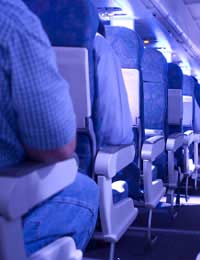Fear of Flying and Panic Attacks

An extreme or irrational fear of flying or aerophobia, can manifest itself in many ways, suffering from strong physical symptoms can be just one of these results. A panic attack is an intense response to external stimuli such as a phobia and can be very frightening for the individual and those around them.
What is a Panic Attack?
A panic attack is an adverse physical response or reaction to something that causes excessive anxiety. It is the highest level of anxiety and causes the body to struggle to function normally.During a panic attack levels of adrenalin and blood flow around the body are increased causing heightened responses both physically and psychologically contributing to a persons ‘fight or flight’ reaction; emotional, biological and behavioural outcomes are altered or changed from their usual states.
Signs and Symptoms of a Panic Attack
A panic attack is caused by excessive anxiety, therefore the symptoms experienced by someone suffering from anxiety will be heightened. Gastrointestinal disturbances such as nausea, vomiting, constipation or diarrhoea are common, along with a dry mouth, dizziness, lack of concentration, a temporary inability to concentrate, shivering, sweating, numbness and palpitations. Sufferers may encounter many of these problems or just one.One of the most frightening features of a classic panic attack is to lose control of breathing; it often becomes shallow, faster and more difficult which in turn causes fear and distress heightening the attack. Though these symptoms can be frightening to experience or observe, the attacks themselves are normally non-damaging to the person.
Treating a Panic Attack
Immediate treatment for a panic attack is to try and keep the environment calm and stress free so that the sufferer can begin to regain control of their breathing; breathing exercises that are familiar and previously successful will vastly improve this process.Medications such as tranquillisers can help to relax and sedate the person, though these must be by prescription only and prescribed only for the use of the affected person. Medications can be very useful for helping the person to calm down and return to their natural physical state but therapies should be sought to find a long-term coping mechanism.Drinking alcohol can exacerbate the symptoms of anxiety and panic attacks, so though it may be tempting to use alcohol as a way of relaxing oneself, it is worth remembering that it is more likely to have an adverse effect.
How Can The Airline Help?
Many airline staff, including those working at the airport will be trained in managing situations such as this and will be able to aid both the sufferer and their companions until the individual’s condition is improved.When booking your flight or holiday, or even when checking-in after arriving at the airport, always ensure that the staff are informed of nervous travellers and they may be able to make special arrangements for private boarding or for a choice of seat, such as away from the emergency exit, in the least confined space or something that will help to reduce symptoms.
Panic attacks can be a very frightening and debilitating experience, and the fear of having a panic attack can cause enough anxiety to actually induce one so the most beneficial option would be to treat the anxiety in advance of booking or taking a flight.








